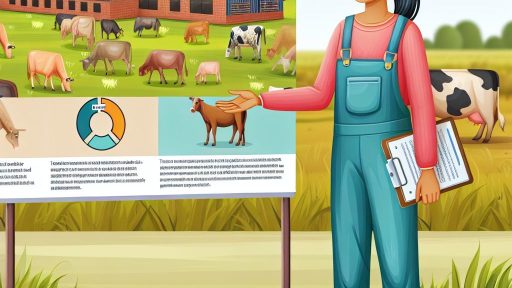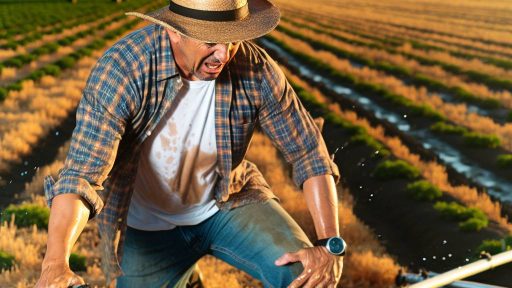Introduction to Sustainable Farming and its Importance
Sustainable farming practices are essential for environmental preservation.
They minimize the negative impacts of agriculture on the ecosystem.
Moreover, sustainable farming promotes biodiversity and soil health.
This method also helps in combating climate change.
It ensures that natural resources remain available for future generations.
One key aspect of sustainable farming is agroecology.
Agroecology combines traditional agricultural knowledge with modern science.
As a result, it enhances the resilience of farming systems.
Another important concept is the circular economy in farming.
This approach focuses on reducing waste and increasing resource efficiency.
Consequently, farmers can achieve better yields with fewer inputs.
Furthermore, sustainable farms often produce healthier food options.
Consumers are increasingly seeking products that align with their values.
This shift in demand drives the need for sustainable practices.
In addition, certified sustainable farms may receive price premiums.
Transform Your Agribusiness
Unlock your farm's potential with expert advice tailored to your needs. Get actionable steps that drive real results.
Get StartedThese benefits motivate farmers to adapt sustainable practices.
At a broader level, sustainable farming contributes to food security.
It helps ensure that communities have access to nutritious food.
Overall, sustainable farming plays a vital role in protecting our planet.
Therefore, understanding its principles is crucial for future agriculture.
Overview of Sustainable Farm Audits
Definition of Sustainable Farm Audits
Sustainable farm audits evaluate farming practices for environmental sustainability.
They assess how crops are grown, livestock is raised, and resources are managed.
These audits focus on minimizing environmental impact and enhancing eco-friendliness.
Purpose of Sustainable Farm Audits
The primary purpose of these audits is to ensure compliance with sustainability standards.
They help farmers identify areas for improvement in their practices.
Consequently, audits can lead to better resource management and conservation techniques.
Benefits of Sustainable Farm Audits
Sustainable farm audits offer various benefits to farmers and the environment alike.
- They enhance the credibility of sustainable practices among consumers.
- Audits can lead to potential cost savings by improving efficiency.
- Furthermore, they foster a positive public image for businesses.
- These audits contribute to long-term environmental health.
Key Components of Sustainable Farm Audits
Several key components are essential for effective sustainable farm audits.
- Regenerative Practices: Focus on improving soil health and biodiversity.
- Resource Management: Evaluation of water, energy, and input use.
- Animal Welfare: Assessment of livestock conditions and treatment.
These components work together to create a comprehensive overview of sustainability efforts.
The Certification Process: Steps and Requirements
Understanding the Importance of Certification
Certification provides assurance of sustainable practices.
It enhances marketability and consumer trust.
Additionally, it often leads to premium pricing for certified products.
Initial Assessment and Planning
The first step in the certification process is conducting an initial assessment.
Farmers must evaluate their current practices against standards.
This helps identify gaps and areas for improvement.
Planning entails creating an action plan to address deficiencies.
Compliance with Standards
Farmers must familiarize themselves with specific certification standards.
These standards often include environmental, social, and economic criteria.
Meeting these standards requires diligent record-keeping and monitoring.
Showcase Your Farming Business
Publish your professional farming services profile on our blog for a one-time fee of $200 and reach a dedicated audience of farmers and agribusiness owners.
Publish Your ProfileDocumentation is essential to demonstrate compliance during audits.
Training and Capacity Building
Training staff on sustainable practices is an important step.
Workshops and seminars can provide valuable knowledge.
Additionally, resources and guides can support farmers in their efforts.
Capacity building enhances skills for better implementation of practices.
Application Submission
Once ready, farmers can submit their certification application.
This application may include a detailed description of their practices.
It also requires providing necessary documentation and fees.
Conducting the Audit
After application approval, a third-party audit takes place.
The auditor evaluates compliance with the specified standards.
Audits may include on-site visits, interviews, and document reviews.
Results of the audit are compiled in a detailed report.
Receiving the Certification
Successfully passing the audit leads to certification approval.
Farmers receive a certificate that verifies compliance.
This certificate is typically valid for a specific period.
Renewal requires ongoing compliance and subsequent audits.
Continuous Improvement
Post-certification, farmers should continue improving practices.
Feedback from audits can guide future enhancements.
Regularly updating knowledge about sustainable practices is vital.
Continued commitment fosters long-term sustainability in farming.
Explore Further: Renewable Resource Utilization for Small-Scale Farmers
Key Standards and Criteria for Sustainable Farming Certifications
Introduction to Sustainable Certifications
Sustainable farming certifications establish criteria for environmental stewardship.
These standards help promote ecological balance and responsible practices.
In addition, they provide guidance for optimizing resources.
Major Certification Bodies
Several key organizations oversee sustainable farming certifications.
Organic Certification is one widely recognized standard.
Other notable organizations include the Rainforest Alliance and Fair Trade.
Each body has distinct criteria targeting sustainability goals.
Core Principles of Sustainable Farming
Sustainable farming starts with maintaining healthy soils.
Practices such as crop rotation enhance soil fertility.
Water conservation techniques are also critical for sustainability.
Additionally, biodiversity protects ecosystems from pests and diseases.
Environmental Criteria
Environmental criteria assess the impact of farming practices.
Farmers must demonstrate reduced chemical usage.
They also need to manage waste responsibly.
Additionally, energy efficiency is a central focus.
Using renewable energy sources contributes to these goals.
Social Responsibility
Social criteria ensure fair treatment of farm workers.
Farmers must provide safe working conditions and fair wages.
Community engagement and development also play significant roles.
Showcase Your Farming Business
Publish your professional farming services profile on our blog for a one-time fee of $200 and reach a dedicated audience of farmers and agribusiness owners.
Publish Your ProfileResponsible sourcing of inputs supports local economies.
Economic Viability
Economic criteria focus on the financial sustainability of farms.
Certifications help farmers access premium markets and consumers.
They also facilitate better resource management and cost savings.
Investing in sustainable practices generates long-term benefits.
Transition to Certification
The certification process involves assessing current practices.
Farmers should conduct self-audits before official assessments.
Seeking guidance from consultants can smooth this transition.
Continuous education on sustainable practices is vital.
Networking with other certified farmers fosters shared learning.
Benefits of Sustainable Certification
Achieving certification provides numerous advantages.
First, it enhances the farm’s marketability and consumer trust.
Second, it encourages best practices among peers.
Additionally, certified farms often receive financial incentives.
Ultimately, sustainable certification contributes to positive change in agriculture.
See Related Content: Sustainable Beef Cattle Farming Methods for Eco-Friendly Ranching
Roles of Auditors in Sustainable Farm Audits
Evaluating Compliance
Auditors assess whether farms meet established sustainability standards.
They review documentation to ensure compliance with environmental regulations.
Additionally, they conduct site visits to observe farming practices.
This evaluation helps identify areas for improvement in sustainability efforts.
Providing Objective Feedback
Auditors offer impartial insights into the farm’s operations.
They highlight strengths and weaknesses in sustainability practices.
Furthermore, they recommend best practices for enhancement.
This feedback fosters growth and development in farming techniques.
Ensuring Accountability
Auditors hold farms accountable for their sustainability claims.
They verify that practices align with certifications obtained.
This accountability builds trust among consumers and stakeholders.
Facilitating Continuous Improvement
Auditors encourage ongoing evaluation of farming practices.
They promote a culture of continuous improvement within the farm.
Moreover, they provide resources and tools for better performance.
This support leads to more sustainable farming methods over time.
Educating Farmers
Auditors play a significant role in educating farmers about sustainability.
They share knowledge on best practices, regulations, and technologies.
This education helps farmers make informed decisions.
Ultimately, it contributes to the long-term success of their operations.
Gain More Insights: Renewable Resource Utilization to Improve Farm Profitability

Common Challenges in Sustainable Farm Audits and Certifications
Understanding the Audit Process
The audit process can be complex and overwhelming for many farmers.
Farmers often struggle with understanding the criteria and requirements.
This confusion can lead to incomplete submissions and delays.
Moreover, each certification body has its own standards.
Showcase Your Farming Business
Publish your professional farming services profile on our blog for a one-time fee of $200 and reach a dedicated audience of farmers and agribusiness owners.
Publish Your ProfileAs a result, farmers must adapt to different guidelines frequently.
Documentation Requirements
Thorough documentation is essential for successful audits.
However, keeping accurate records can be challenging.
Many farmers lack the necessary tools to streamline recordkeeping.
Additionally, understanding what to document is not always clear.
This often leads to gaps in important information.
Compliance Costs
Compliance can be costly for sustainable farmers.
Expenses include hiring consultants and purchasing organic materials.
These costs may deter some farmers from pursuing certification.
Nevertheless, achieving certification can enhance market access.
Ultimately, this may justify the initial investment.
Time Constraints
Auditing and certification processes require significant time and effort.
Farmers often balance multiple responsibilities on their farms.
Finding time to prepare for audits can be difficult.
This results in rushed submissions, increasing the risk of failing the audit.
Time management strategies can greatly assist in this area.
Access to Resources
Access to educational resources is vital for farmers navigating audits.
Unfortunately, many farmers face limitations in this area.
Some lack knowledge about sustainable practices and their benefits.
Others may not have access to training programs or workshops.
Improving access to resources can enhance overall compliance rates.
Cultural and Community Support
A supportive community can play a crucial role in successful certification.
Farmers sometimes feel isolated in their sustainability efforts.
Networking can provide motivation and shared resources.
Building a community around sustainability fosters collaboration.
Such support networks can help address common challenges effectively.
Gain More Insights: Creating a Resilient Food Forest Using Permaculture Practices
Benefits of Certification for Farmers and Consumers
Enhanced Market Access
Certification opens doors to new markets for farmers.
Retailers and consumers often prefer certified products.
This access can lead to increased profits for farmers.
Improved Farming Practices
Sustainable farming practices are emphasized through certification.
Farmers learn to implement eco-friendly techniques.
As a result, they can reduce their environmental impact.
Consumer Trust and Assurance
Certification builds trust between consumers and farmers.
Consumers feel confident in the quality of certified products.
This trust encourages repeat purchases and brand loyalty.
Compliance with Regulations
Certification helps farmers comply with local and global regulations.
This compliance can protect them from legal issues.
Moreover, it prepares them for potential audits and inspections.
Access to Resources and Support
Certified farmers often gain access to additional resources.
Showcase Your Farming Business
Publish your professional farming services profile on our blog for a one-time fee of $200 and reach a dedicated audience of farmers and agribusiness owners.
Publish Your ProfileThis can include training programs and financial assistance.
Support from agricultural organizations may also increase.
Positive Environmental Impact
Farmers enhance sustainability through certification.
They adopt practices that protect soil, water, and biodiversity.
As a result, the overall health of the ecosystem improves.
Market Differentiation
Certification allows farmers to differentiate their products.
This differentiation can foster unique branding opportunities.
Consumers typically pay premium prices for certified goods.
Emerging Trends in Sustainable Farming Audits and Certifications
Growing Popularity of Organic Certifications
Organic certifications have gained significant traction in recent years.
Consumers increasingly demand organic products for health and environmental reasons.
The rise of organic farming reflects changing preferences across demographics.
Consequently, farmers are adopting organic practices to meet market demands.
Technological Advancements in Auditing Processes
Technology is transforming how auditors assess sustainable practices.
Innovative tools streamline data collection and analysis during audits.
Mobile applications enable real-time tracking of farm sustainability metrics.
Additionally, blockchain technology enhances transparency in supply chains.
Focus on Climate Resilience
Climate change impacts are prompting a shift in auditing criteria.
Farmers are encouraged to adopt practices that promote resilience to environmental shocks.
Certifications now increasingly incorporate climate-related evaluations.
Moreover, sustainable practices can mitigate climate-related risks effectively.
Integration of Social Responsibility Standards
Social sustainability is becoming a significant component of audits.
Auditors now assess labor practices and community impact in farming operations.
Fair treatment of workers is a growing concern among consumers and certifiers.
Consequently, certifications are evolving to incorporate social justice criteria.
Adapting to Regulatory Changes
Regulatory frameworks for sustainable farming are becoming more comprehensive.
Farmers must stay informed about changing compliance requirements.
Certification bodies are continuously updating their standards to align with regulations.
Consequently, ongoing professional development is essential for farmers and auditors.
Growing Interest in Alternative Certifications
Emerging certifications are gaining attention alongside traditional ones.
Farmers are exploring options beyond organic certifications for market access.
Regenerative agriculture and permaculture certifications are examples of this trend.
These alternatives offer innovative approaches to sustainable agriculture.
As a result, farmers can diversify their practices and certification options.
Additional Resources
Accelerating Sustainable Pest Management: A Roadmap for California




